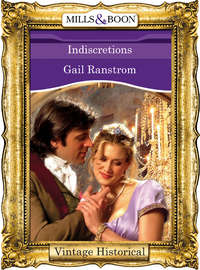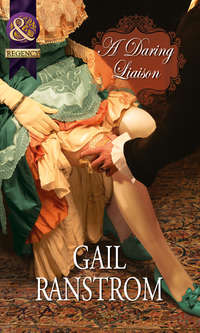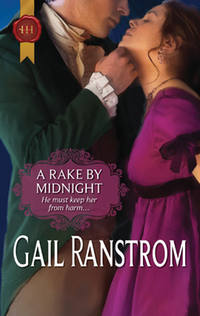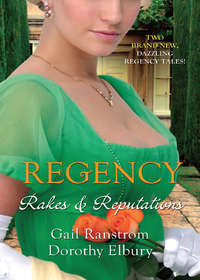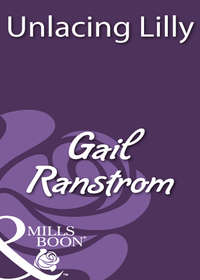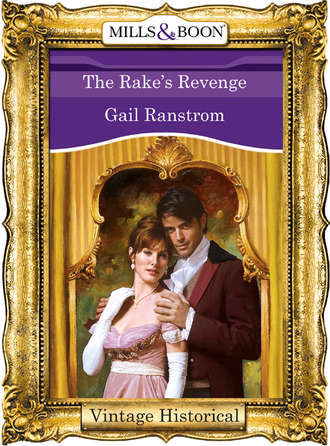
Полная версия
The Rake's Revenge
His smile did not falter, nor did his expression change, but she felt a subtle change in him. He knew she was lying!
“I see,” he murmured. “Another time, Miss Lovejoy?” Without waiting for an answer, he bowed and departed in the direction of the game room.
Afton was appalled at the odd mixture of excitement and dread that filled her at the thought of seeing Lord Glenross again. She turned to Grace and lamented, “If there were only some way to refuse him!”
Grace looked doubtful. “If you wish, I shall tell him I could not discover how to contact Madame Zoe.”
A complete waste of time. If Glenross did not have the referral from Grace, he would acquire it elsewhere. Slowly, painfully, Afton’s heartbeat steadied. She shook her head. “Send Glenross my factor’s address, and I shall instruct Mr. Evans to grant an appointment as soon as possible. As Shakespeare said, ‘If it were done when ’tis done, then…”
“‘…’twere well it were done quickly.’” Grace finished the quote with a nod of agreement. “An excellent idea. Mr. Evans shall handle it all. He is the very personification of discretion.”
Afton steadied her nerves and gave her aunt a small smile. “I shall simply tell Lord Glenross a happy little fortune and be done with him.”
Chapter Two
S omeone was in his room…someone who didn’t belong. Key in one hand, Rob paused with his other on the knob of his hotel room door. The fine hairs on the back of his neck stirred with an uneasy prickle.
It was unlikely that the Dey would have sent men after him. Unlikely, but not impossible. And he’d damn well die fighting before undergoing the Dey’s “hospitality” again. Being locked cramped and naked for weeks on end in a box so small he could neither turn nor raise his hand to scratch an itch, being left to wallow in his own filth, freeze by night and swelter by day, had taken its toll. A good day had been when someone took pity and threw an urn of fetid water over the box, and a few drops had trickled between the slats and cooled his stinging flesh. Rob could not yet think of the bad days—days he had been manacled spread-eagled against a dank dungeon wall for whippings that tore flesh from his back, while demands for information were screamed in his ears.
But there had been worse. Much worse. Bile rose in his throat as a sweat broke out on his forehead. No. He’d deal with that later. He wasn’t ready yet.
He braced himself and turned the knob. It gave without a click. Unlocked. He distinctly recalled locking it before leaving for Mrs. Forbush’s soiree.
He bent and slid his dagger from his boot. They wouldn’t take him alive this time. A quick glance down the corridor confirmed that he was quite alone.
He gripped the dagger in his right hand and eased the door open. A faint glow from the banked fireplace barely afforded enough light to make out the form of furniture. A movement from the chair facing the fire drew his attention.
Every muscle controlled, he crept forward. He stilled his breathing as he approached the back of the chair, knowing that even the air stirred by his breath could alert a seasoned thief or a foreign assassin. Surprise was his greatest advantage.
He jerked the man’s head back, his blade pressing against the interloper’s throat before he could react. “Identify yourself,” he snarled in the man’s ear from behind.
“Gads, Robbie! It’s Doogie! D’ye not remember me?”
Rob dropped his hand and released his brother, nearly weak with relief. “Douglas! What are you doing here?”
“I got Travis’s note and I’ve been trailing your footsteps ever since, always a step behind. Thought I’d just come to your lodgings and wait. I got the maid to unlock for me.”
Rob did not even want to know how his brother had bribed the maid. Douglas had a way with women, and never had trouble getting what he wanted of them. Rob slipped the dagger back in his boot as Douglas came around the chair to embrace him.
A moment later, embarrassed by his display of emotion, his brother released him and stepped back. “Damn me, Rob, say you won’t be going abroad again. My heart canna take it.”
“I willna,” Rob promised, falling into the comfortable brogue of their youth. “I’m back to stay.”
“That’s good. I’d have made a poor laird.” Douglas went to the bureau and retrieved Rob’s bottle of Scotch whiskey. He refilled his glass and poured one for Rob. “To the return of the McHugh!”
There’d been no whiskey in Algiers or in the government hospital where he’d been held since his return. Rob drank deep, eager for the fire and pleasant lethargy that would seep through him when the Scotch did its work. Maybe tonight he’d finally be able to sleep. “To Doogie McHugh and his lady fair.”
“Ach. So you’ve heard?” Douglas grinned and sank back into his chair. “She’s an angel, Rob. I don’t deserve her.”
“I met Miss Barlow last year. She is lovely, Douglas. She’ll give you beautiful babes. Mind that the first one’s a boy, for the title.” Rob wondered how his brother could prefer bland Bebe Barlow when there were more tasty morsels about—like that appetizing little Miss Afton Lovejoy. Now there was something he could envy Douglas for. Aye, Miss Lovejoy was right to be wary of him. He’d swallow her in a single bite.
“I’ll do my duty, and wear a smile doing it,” Douglas vowed.
“I always said you were a brave lad,” Rob teased. “You’re fond of her, then? The match wasn’t for expedience?”
“Bebe is my life, Rob. She’s the reason I draw breath.” Douglas’s face sobered and he glanced down at his feet. “Sorry, Rob. I didn’t mean to remind you. But, in time, you will marry again. You’ll have the heir you always wanted.”
“I’ll leave that to you, Douglas. ’Twill be your son now who’ll bear the Glenross title.” Doogie hadn’t known that Hamish hadn’t been a McHugh by blood. No point in telling him now, Rob supposed. He had grown to love the boy and had learned to ignore Maeve’s indiscretion.
“You say that now, Rob, but some pretty face will turn your head and you’ll change your tune.”
“I’ve not got the mettle for marriage.” And he hadn’t the heart to risk deceit again. Deceit and denigration.
“’Twas none of your fault, man. Maeve’s the one who insisted she visit her sister in Venice. She was a determined woman and made her own decisions.”
Douglas was wrong. Rob didn’t blame Maeve for that particular decision. But he knew who was responsible—the damn charlatan who’d hinted that his wife’s destiny awaited her in Venice. That she should go there to escape the man who would destroy her: him. Rob would hunt Madame Zoe until he could expose her for the imposter she was, and then he’d utterly destroy her—her confidence, her trade, her income and, sweetest of all, her reputation. By the time he was finished with her, no member of society would consult her.
Ah yes. He’d learned to be a very patient man lying alone in a cramped box while oozing infection from his wounds and planning his escape. All those months in the Dey’s dungeon he’d been waiting, going slowly mad. And he’d planned. Madame Zoe would pay for destroying the McHughs.
Monday morning, in the well-appointed offices above a bank, Rob studied his fingernails in a pose of casual boredom as Mr. Evans, Madame Zoe’s factor, leafed through her appointment book with a great show of accommodation. Indeed, Rob was anything but bored. It was December 14, and by his estimation, he should be finished with Madame Zoe no later than Christmas. He studied his surroundings, imagining the sort of woman who would employ Mr. Evans.
The office was estimable in every sense of the word. Comfortable chairs sat along one wall and the factor’s desk was clean, polished and modest. Mr. Evans himself appeared to be an eminently respectable man in his middle years, and Rob wondered why he would represent a charlatan.
The London gossip mill held that Madame Zoe was a middle-aged French émigré, a fortune-teller to the French court who had foretold the rise and fall of Napoleon Bonaparte. She was a widow, ’twas told, and always wore black. Liberal use of veils prevented anyone from giving an accurate description. Some even speculated that she was a prominent member of the noble but impoverished French community in London and employed the veils to prevent recognition in that circle.
Charlatan or not, Madame Zoe was clever to have put such an elaborate process in place. Before she ever saw a new client, the person had been screened by her factor. Only then was the client given an appointment time and the address at which she could be found. What a sweet little setup.
Tired of waiting for what was essentially a simple task, Rob slouched in his chair and asked, “So you do all Madame Zoe’s procuring?”
Mr. Evans flushed. “I make appointments for consultations with Madame Zoe. I am a factor, not a flesh peddler. She is extraordinarily busy, what with the ton in town for the season.”
“I will take whatever appointment she has available.”
The man cleared his throat. “Payment in advance.”
“Payment in advance?” Rob repeated, just to be certain his displeasure was evident. What a lot of nerve—demanding to be paid in advance for a pack of lies!
“Yes, my lord. Without exception,” the man confirmed.
“What if she has nothing to tell me?”
“There are no guarantees, my lord. And no refunds.”
Rob watched the man steadily, knowing his attention was unnerving. It was a technique he frequently used when eliciting a confession. The enemy always feared his silence meant that he knew more than he actually did.
“Madame Zoe has had a cancellation,” Mr. Evans said after flipping through a number of pages in the little leather-bound appointment book. “She can see you this afternoon at three o’clock,” he said after an uneasy moment. “Shall I put you on the books, my lord?”
“Yes,” Rob said, more harshly than he intended.
The factor dipped his pen in an inkwell and scratched a line of writing across a piece of paper. “Five pounds, please.”
Five pounds! Though it galled him to pay even a ha’penny, Rob handed over the required sum in exchange for the address.
Afton climbed the steep stairway that rose from a hidden panel in La Meilleure Robe to open in the closet of Madame Zoe’s second-floor flat. Should anyone follow her, it would appear as if she had gone to the shop for a fitting with Madame Marie. And when she left, it was through the same closet and out of Madame Marie’s door.
At the top of the secret stairs, the abandoned servants’ access from the time when the building had been a private residence, she listened carefully for a moment, her ear against the wooden panel. She was always a little afraid one of her patrons might have arrived early and entered by force, in an attempt to discover her true identity. Or worse—that the murderer had returned, broken into the flat, and lay in wait for her. That possibility had led Grace to insist that Afton carry a small, but very sharp, dagger. Reassured by the silence, she pushed the secret door open and slipped through into Zoe’s salon.
Afton lifted the heavy tapestry curtain that separated the back room from the main room, and went to light the fire banked in the small fireplace. That done, she opened the cupboard containing the tools of her trade: a deck of tarot cards, a deck of ordinary playing cards, a crystal orb, a bowl for water gazing, astrological charts, runes, candles, incense and a host of other items that she had no idea how to use. Guessing that Lord Glenross would not ask for anything unusual, she retrieved a deck of cards and left it on the round table in the center of the room.
Lord Glenross, Robert McHugh. Though foppish elegance and a slender frame were all the rage, Afton preferred a more substantial man, and Glenross was certainly that. He was almost too muscular for current styles. The narrowly cut jackets strained over his shoulders and chest in a most distracting manner. The prospect of being alone with him, even in disguise, caused her no small amount of anxiety. To her, he was larger than life. He filled a room, claiming it with no more than a crooked smile. And his eyes! Those cool ice-green eyes that looked right through her flesh to her soul! Thank heavens for her veils!
A glance at the clock on the small dressing table inspired her to hasten. She had slipped out of an impromptu tea and lively discussion of Lord Byron’s latest exploits, with barely a nod in her aunt’s direction, but the delay had caused her to run late. She stripped and donned black crepe de chine widow’s garb that covered her from throat to toe. Above that, a gray wig topped by black silk veils obscured her face. Last, she pulled on a pair of white silk gloves to cover her hands. Nothing, she knew, would betray her identity.
The clatter of horses’ hooves and the jangle of harness from the street below drew her to the window. A black town coach drew up outside and the door opened. Instead of a patron of Madame Marie, the occupant was none other than her client. Early. Afton smiled, thinking he must be more anxious for a reading than she’d thought, and watched through the sheer lace panels as the top of his head disappeared though the doorway below. She wondered again at the incongruity of a man like McHugh consulting a fortune-teller as she decided not to pull the heavy velvet draperies over the lace curtains.
For good measure, Afton checked her appearance in the mirror above the fireplace. Yes, the veils obscured her features and made her virtually unrecognizable. She would be safe enough. Just as she lit white candles and sandalwood incense, a knock sounded at the door. She lifted the little brass disk that covered the peephole to see the Scot, quite alone. She paused with her hand on the latch, anxiety twisting her stomach in knots.
“He is just curious,” she whispered to herself, though she was too well aware that any client—this one?—could be Auntie Hen’s murderer. She glanced at the bell rope, touched the little dagger in her sewn-on pocket, squared her shoulders and lifted the latch.
The door opened slowly, revealing a smallish woman swathed in black. Even the heavy veils covering her face betrayed no hint of the features beneath. Though he itched to peel the layers back and expose the face, Rob schooled himself to patience. Madame Zoe’s actual identity was only one part of his problem. He could discover that whenever he chose. He needed to know her weaknesses, to uncover her vulnerabilities and decide the perfect way to destroy her. He estimated he would need at least three visits.
“Entrez, m’sieur.” Soft, well-modulated tones greeted him as the veiled woman stepped aside to grant him entry. If that was a crone’s voice, he was not Rob McHugh.
A quick glance around the small room revealed a dozen telling details. The meager supply of wood on the hearth indicated use of the room for only short periods of time. Personal items were at a minimum. This was a salon only, not a home for the fortune-teller. The furnishings were tasteful, though shabby and worn. A single window facing the street below was hung with an airy lace curtain, and small pots of greenery lined the sill. Blue velvet draperies could be pulled for additional privacy, and would darken the room for a mystical atmosphere. A curtained alcove in the far corner likely hid a chaise and washstand, perhaps a wardrobe or clothespress. The only concession to female vanity was the old mirror mounted above the fireplace.
But most interesting to Rob was the small dark stain on the threadbare rug beneath the central table. Tea? Wine? Blood? Very interesting. And then there was the discreet bell rope hung from a hook near the fireplace. Where would it ring?
“M’sieur?” the woman asked again.
“Madame Zoe? Am I late?”
“Mais non,” she said. As he passed her going into the room, he caught the subtle scent of lilies of the valley. Sweet, warm, seductive. Also very interesting.
She swept her arm toward the table in the center of the room in an invitation to sit.
“Do you know who I am?” he asked, ignoring the chair.
Her voice was still soft and heavily accented, but now held a hint of humor. “I know all, m’sieur.”
He laughed, amused by her conceit. “Then who am I?”
“You are my three o’clock appointment, m’sieur.”
Clever thing. He shook his head. She was not going to make him like her. “Do you mock me?”
“Mais non, m’sieur.” She gripped the back of the chair opposite the one she had indicated for him. “That would be very bad for the business, no?”
“My business, at any rate.”
“So. You ’ave the curiosity to know what the future ’olds for you?”
“Yes, indeed.” He nearly rubbed his hands together in anticipation.
“’Ow do you wish your fortune told, m’sieur? Cards? Tarot? Tea leaves? Crystal orb? Runes?”
Rob gestured at the deck of cards on the table. “Cards.”
He smiled as she sat and made a graceful mystic gesture over the deck, as if invoking the fortune-telling god, before passing the deck to him. “You must shuffle the cards, m’sieur. They must carry your energy. Your…essence.”
Without sitting, Rob shuffled the deck three times before sliding it back across the table to her. She then dealt a circular pattern of cards, faceup, on the table and placed one card facedown on top of each. In the center of the pattern, she turned a single card up. The king of spades.
Pointing to it, she said, “You, m’sieur.”
“Are you quite certain?”
“Oui. Were this a tarot deck, you would be the king of swords. A good card. A strong card. A warrior.”
Flattery? Somehow he thought not. “Swords, eh? What am I doing?”
She pointed to a queen of hearts. “Doutant moi.”
Another joke? “How do you know you are the queen of hearts?”
“She is presently close to you and ’as the gift of sight. Do you know such another?”
She had him there. “No,” he admitted.
“Voilà! C’est moi.” There was a note of triumph in her voice, as if she had surprised even herself.
“Will my doubt prevent you from giving me a reading?”
Madame Zoe sat back, folded her hands in her lap. “Mais non, m’sieur. Do not concern yourself. The cards are what they are. But I feel the doubt in you. You do not think telling the future is possible, no?”
“Pray, do not allow my reservations to hinder you. This is my first time at a fortune-teller. You must allow me my little doubts.” He took the chair across from her and folded his arms across his chest.
She appeared to be weighing her words, deciding what to say, or how much. “You are a warrior, m’sieur. You ’ave come ’ere with the…plan. The strategy. There is something you wish to know, but you will not speak it aloud.”
He raised an eyebrow. That was a clever ploy. While quite true of him, the same could be said of nearly everyone who visited a fortune-teller. “Hmm. Must I speak it aloud, madame, for you to answer the question?”
“No. I confess it would be easier, but not needed.” She pointed to the ten of spades. “I think it ’as to do with the revenge. I do not see a ’appy outcome, m’sieur. Revenge is a two-edged sword. It draws blood on both sides, n’est-ce pas? One cannot be certain ’oo will be cut.”
A remarkably good guess, he thought. “Sometimes the reason for revenge makes it worth the risk.”
She shook her head slowly. “Mais non, m’sieur. There are only two reasons for revenge. Both silly.”
“And those reasons would be…”
“L’amour ou l’argent, monsieur.”
Of course. Love or money. One did not have to be a fortune-teller to know this. “Which do you think is my motive?” he asked, unable to keep the challenge from his voice.
Her own voice was steady and sure. “Love. You are not a man to quibble over money.”
“You are very logical, madame. Very perceptive.” Was it perception that passed for fortune-telling? Did she merely tell people what she guessed they wanted to hear? Was she little more than an intuitive observer?
“Not logical, m’sieur. I only speak what the cards say.”
“Balderdash!” The word was out before he could stop it.
A small muffled laugh emerged from beneath the veils. “I am sorry you think so. Néanmoins, you ’ave come for the reading, and I shall oblige.” She bent over the spread cards once again in an attitude of rapt concentration, turning the facedown cards up in a precise pattern. “You, and you alone, ’ave the power to determine your future. What I tell you now is only what could be…what might be. You must choose your course.
“You are now suffering from…’ow you say—chagrin d’amour?”
The corner of his mouth twitched. “You say, ‘a broken ’eart.’” At last Madame Zoe was going astray. Maeve and Hamish’s deaths had not broken his heart, they had hardened it.
“Oui, ’eartbreak. But you must not worry, m’sieur. You will love again. You will love deeper.” She pointed to the queen of clubs. “She was not your grande passion. You will ’ave la grande passion. If…”
“If?”
She shrugged. “If you let go of your ’urt. If not, your quest for revenge will poison you and those around you.”
Dangerously close! How could she garner that from a few common cards? “You misunderstand, madame. What you call revenge, I call justice. As for putting it aside—that’s easy to say, impossible to do.”
“M’sieur, I…” She trailed off in a sigh.
“If you have something to tell me, madame, do so,” he said.
She leaned over the cards again and turned another three up, then another three, stopping to study the way the cards had fallen. “Danger. Clearly, danger. Spreading in a radius around the king—you, m’sieur. Alas, I cannot tell if the danger is to the king or from the king. It may be both. You must be very careful, m’sieur.” She fell silent, her head bent over the cards.
Damnation. Was she about to give him a warning from the cards? Had he just tipped his hand? He stirred uneasily as he waited for her to finish. “Madame? Have you fallen asleep?” he asked when the silence stretched out.
When she answered, her voice was subdued, and he felt for the first time that she was hedging. “You must not worry, m’sieur. The matters that are troubling you will soon come clear.”
“Is that what your cards tell you?”
She touched her forehead through her veil. “I…I ’ave suddenly come over with the malaise, m’sieur. I will instruct my factor to reimburse you.”
“I do not want reimbursement, madame. I want a reading.”
The hand on her forehead began to tremble, and Rob realized she was not feigning to get rid of him. She was actually in distress. He leaned toward her, surprising himself with a quick pang of concern. “Do you require assistance, madame?”
She waved one hand to prevent him from coming closer. “’Ow kind of you, mais non. I must ’ave quiet. I cannot see your future, m’sieur. There are clouds, barriers—”
“Ah.” He nodded “The doubts you spoke of earlier.”
“Oui,” she sighed.
“Then can you tell me the past?”
She studied the remaining cards after fanning them in an arc across the table. “Your past is filled with, ah, turbulence. And much pain, I think. There ’as been betrayal and injury. You ’ave learned not to trust. You…you are a man of strong passions, though you ’ide it well. You are intelligent, thoughtful, deliberate—relentless in pursuing your goal. Alas, m’sieur, you are not ’appy. You ’ave the deep ’urt. You must overcome these things if you are to live again. In the present, m’sieur, you do not allow for the—’ow you say—caprice of life. For the whim, the ’umor or the silly thought. You ’ave not learned that dreams, no matter ’ow impossible, make dreary lives worth living, and that when ’ope dies, the ’uman spirit dies. You ’ave not found within you the ability to laugh at life’s absurdities. The world does not turn because you turn it, m’sieur. Au contraire. It turns of its own accord. Time is even more relentless than you.”
He narrowed his eyes at the unvarnished rebuke. She had not falsely flattered him, nor couched her message in a veil of euphemisms. And her reckoning was dead-on. He hadn’t a single whimsical bone in his body. That she knew so much about him made him uncomfortable. He began to think that, however misguided, she might be sincere in her delusions of “knowing all.”



